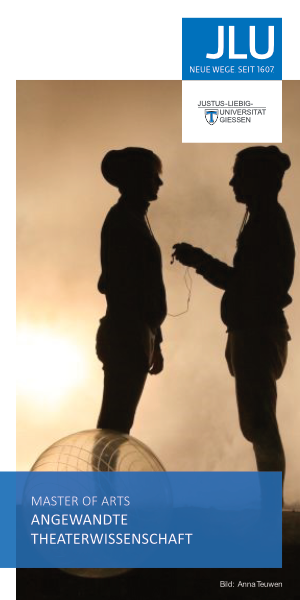Applied Theatre Science (M.A.)
Taught in German
Overview
- Overview
-
Overview
This Master's programme is a consecutive programme based on relevant Bachelor's degrees. Further information on admission can be found under "Application".
The Master's programme includes a deepening and extension of both the theory of theatre and the practice of performative arts. In the second year, the programme offers you the opportunity to focus your studies either on the artistic practice (Master of Arts degree: "Applied Theatre Studies: Study Focus 'Practice of Performative Arts'") or on theory (Master of Arts degree: "Applied Theatre Studies: Study Focus 'Theory and Aesthetics of Performative Arts'") of theatre.
The professional application of the specialisation " Practice of performative arts " will be more in the area of artistic practice (direction, performance art). Those who choose the specialisation "Theory and Aesthetics of Performative Arts" will be more likely to focus on dramaturgy, journalistic or editorial work or scientific research.
The close integration of theory and practice of theatre in both areas of specialisation means that your future professional activity may lie in both the practical and theoretical fields or in mixed forms. The Master's programme also includes two modules of participating subjects, an assistant in the theatre or media field and a Master's thesis, which can be either practical-artistic (e.g. a production) or theoretical-scientific.
- Duration of studies 4 Semester 120 Credit Points (CP)
-
Duration of Studies
4 Semesters - 120 Credit Points (CP)
-
Accreditation
since 20 August 2007
Composition of the Study Programme
- Duration of studies 4 Semester 120 Credit Points (CP)
-
Duration of Studies
4 Semesters - 120 Credit Points (CP)
- Composition of the study programme
-
Composition of degree programme
The Master’s degree programme in Applied Theatre Studies offers the following two different study focuses:
- Focus: Practice of performing arts or
- Focus: Theory and aesthetics of performing arts
Studies that focus on the practice of performing arts conclude with a practical artistic study (e.g. theatrical production). Studies that focus on the theory and aesthetics of performing arts include a theoretical academic thesis. Students must choose their study focus by the end of their first year of studies (first and second MA semesters) at the latest.
The degree programme consists of five theatre studies modules, two modules in the related subjects, one assistance module and the MA thesis module. All modules are compulsory and are worth a total of 120 credit points (CP).Modules
The five theatre studies modules cover the following areas:
- Theory and aesthetics, consisting of two seminars in which students address the theory and aesthetics of performing arts plus an AV tutorial or a reading course.
- Performance practice: Module on the practical exploration of and experimentation with contemporary issues, consisting of a drama project and two practical courses; instead of a drama project, students may develop their own artistic project.
- Theatre Studies MA module: Students choose a seminar in which the special field of their own MA thesis is addressed, and must also take the MA oral examination, which deals with the topics, methods and problems addressed in the students’ thesis and explores individual issues in greater depth.
- Specialisation module: This module gives students an opportunity to attend lectures/tutorials that relate to the topic of their MA thesis or MA theatrical production; the lectures/tutorials may be chosen from Theatre Studies or the related subjects. It consists of a drama project, a seminar or the student’s own artistic production as well as of a practical course and an AV tutorial or a reading course.
- Advanced module in performance aesthetics: The module must tie in with the study focus and can be chosen freely by students within that context. The module components may be taken from Applied Theatre Studies and from Choreography and Performance. Components from different modules may be combined. The possible types of academic session include a drama project, a seminar or the student’s own artistic production plus a seminar or a practical course and an AV tutorial or a reading course.
Two modules from the related subjects
- Aesthetics and literature: The module must tie in with the study focus in theatre studies and is based on the individual knowledge and skills acquired during the student’s BA programme. The choice of taught courses must relate to the MA thesis or MA theatrical production. This module can be taken in Art History, Musicology and German Studies and consists of two seminars plus one lecture, tutorial or introductory course.
- Interdisciplinary extension module: This module can be taken in English Studies, Romance Studies, Slavic Studies, Classical Studies, Philosophy, Sociology and Political Science. Otherwise, the same conditions apply as for the aesthetics and literature module.
The assistance module
Students on the Master’s degree programme in Applied Theatre Studies must complete a professional and employment-oriented practical placement referred to as the assistance module. The module lasts at least four to six weeks, consists of working in an assisting capacity at a recognised cultural/artistic establishment, and is intended to enable students to acquire knowledge of the profession and careers guidance.
Thesis module
The thesis module provides the framework for working on the MA thesis, which generally takes five months.
The final work of the Master’s programme can be theoretical and scientific or practical and artistic. It should show that the student is able to work independently on an academic and/or artistic topic from the area of "drama", "theatre" or "media" with relevant tools and methods of the student’s subject. The final practical/artistic work can take the form, for example, of a theatre or music theatre production, choreography, performance, installation, film or artistic video and must be presented or performed in public.
Application
- Commencement of Studies in the Winter Semester
-
Commencement of studies
Only possible in the winter semester
- Application: entrance requirements
-
Entrance requirements
- BA Applied Theatre Science of JLU and oral examination or
- BA (or equivalent degree) with a relevant subject profile and an artistic aptitude test (portfolio of own art work, BA thesis or equivalent scientific work, oral examination).
- English language knowledge ...information about the required language certificate
- An artistic aptitude test
- Language Requirements
-
Language Requirements
English language skills are required for the Master's degree programme in Applied Theatre Science. This can be demonstrated by:
- at least a secondary school leaving certificate (10th grade), proven by school reports; or
- "Test of English as a Foreign Language" (TOEFL): whereby the test result must be at least 550 points in the paper-based version, 213 points in the computer-based version and at least 79 points in the internet-based version (iBT); or
- "International English Language Testing System" (IELTS): minimum overall score of "6"; or
- Non-student examination in English: at least 11 points; or
- Evidence that is certified according to the Common European Framework of Reference for Languages (CEFR) with at least level C1; or
- Completion of an English-language Bachelor's degree programme.
The Examination Board decides on the recognition of foreign language requirements for applicants who can provide evidence of a higher education entrance qualification obtained abroad or a BA or equivalent degree.
- Application not limited only winter
-
-
Application / Enrolment
-
The study programme is not subject to admission restrictions.
-
The enrolment period for the winter semester begins at the beginning of June.
-
The end of the enrolment period is determined anew each year, please enquire in the application portal during the enrolment period.
Different rules apply in some cases for international applicants. More...
-
-
Career Options
- Career options
-
Career options
The degree programme in Applied Theatre Studies can be applied in a broad range of professional fields, depending to a large extent on the individual students, their gifting and their chosen focuses.
The combination of theory and practice during the study programme opens up a number of career opportunities. For instance, the study programme can lead to an independent artistic career, e.g. in theatrical production, performing arts, dance and choreography, or as a writer.
However, many students also focus, for example, on related art forms such as film production (film direction, camera work), radio drama, video art, interactive media or network art.
A wide range of careers are also available in the field of dramatic arts (municipal and regional theatre, production or festival dramaturgy), the organisation of cultural events (e.g. culture management), journalistic and editorial activities (print media, television, radio) and in publishing (e.g. copy-editing).
Doctoral Studies at JLU
Doctorate possible with a Master's degree
Graduate Centres
International
- International: incomings
-
Information about studying at Justus Liebig University Giessen (incomings)
Departmental contact persons:
International Office
General counseling of international students
Dr. Saltanat Rakhimzhanova, Patrycja Zakrzewska
Goethestr. 58, Room 38
35390 Giessen
Contact and office hours
Further Information
- Further Information
-
-
PDF documents for the courses of study
- Study Guide (in German)
Examination- and study regulations
- Special regulations (in German)
(Please note that only the German version of the modules is offical and legally binding. The english Version is for informative purposes only.) - General study regulations for modular and multi-stage study programmes
Courses offered in the course catalogue
- Electronical course catalogue (in German)
- Study Guide (in German)
-
- Master's Degree Programmes of Faculty 05
-
- Applied Theatre Science
- Anglophone Studies
- Choreography and Performance
- Interdisciplinary Studies on Eastern Europe
- Modern Languages, Cultures and Business Studies
- Modern Languages and Linguistics
- Modern Languages and Language Teaching
- Language, Literature, Culture
- Language Technology and Foreign Language Teaching
- International pages
-
Please have a look at our International Pages for more information in English.
- Any Questions
-

Any Questions?
Information- and advisory services of JLU can be found under the category “contact” on this page!
Contact
-
Subject advisor
- Subject advisor
-
-
Department of Theater Studies
Gutenbergstraße 6
35390 Gießen
Dr. Eva Holling and Bernhard SiebertSecretary's Office:Frau Sylvie Guillou, Frau Julie Pownall and Frau Anna Artysiewicz
Phone: 0641 - 99 31221 Office hours: by appointment
-
-
Links
-
Central Study Advisor
- Frank Uhlmann (Dipl.-Sozialw.)
- Central Student Services
-
- Students office →
(for formal matters like matriculation) - Central student advisory office
(advice for students & prospective students) - Hotline Call Justus
(first contact for all matters pertaining to studies) - International office →
(for international students)
- Students office →

